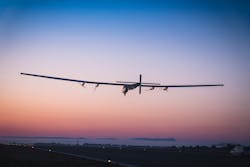Skydweller Aero Inc. validates initial flight hardware and autopilot software
OKLAHOMA CITY - Skydweller Aero Inc., a U.S.-Spanish aerospace company developing solar powered aircraft for defense and commercial industries, announced the successful flight demonstration of the company's initial aircraft control, actuation, and sensor technology systems, after rigorous software design, installation, and ground testing. The company led preliminary testing of their proprietary autonomous software, while measuring and evaluating multiple open-loop system identification inputs to collect data on aircraft's static and dynamic characteristics at various altitudes, a crucial step in the company's preliminary flight test campaign, concluding with an optionally piloted take-off and landing. Once complete, Skydweller will transition to fully autonomous flight testing.
"This successful flight test demonstrates the incredible evolution of this aircraft since its acquisition," said CEO Dr. Robert Miller. "Leveraging rapid development and engineering processes, Skydweller has now begun collecting and analyzing real-world data to further refine and expand the software capabilities necessary for achieving autonomous flight. We are well on our way to meeting our ultimate objective—perpetual flight."
In preparation for this stage in Skydweller Aero's flight test campaign, the company designed key software and hardware components to boost efficiency, integration, and connectivity. These enhancements prove the efficacy of essential hardware required for its future, unmanned variant, along with advancements to aircraft functionality, including sensor, computing, and communications infrastructure required to achieve autonomous flight.
By running critical test points at various altitude, Skydweller Aero also enabled the achievement of a preliminary world record claim: the highest altitude reached and sustained by a U.S.-piloted solar-powered aircraft, hovering at nearly 16,000ft. The test flight was conducted on Sunday, April 18 in Albacete, Spain, the company's provisional site for ground operations and demonstrations.
